7 Best Legal AI Companies of 2026
7 Best Legal AI Companies of 2026
The legal industry is undergoing a remarkable transformation thanks to artificial intelligence integration.
While AI was initially met with skepticism and resistance by many legal professionals, fearing it would compromise job security and the accuracy of their work, its undeniable benefits have led to widespread adoption.
Today, AI is not just a trend but an indispensable tool in modern law firms as it optimizes efficiency, accuracy, and overall productivity better than any other tech can.
Artificial intelligence is profoundly impacting the legal profession, and we’re counting down the top legal AI companies driving this transformation in 2026.

Artificial Intelligence in the Legal Industry
When AI first entered legal practices, it wasn’t exactly met with enthusiasm.
Many legal professionals were hesitant. The thought of machines performing tasks traditionally handled by trained attorneys raised plenty of concerns.
There was a real fear that AI would threaten job security and compromise the precision that lawyers worked so hard to maintain. Some worried these tools would get lost in the nuance of legal language and overlook the human element entirely.
At the time, AI felt like a fleeting trend—too impersonal for such a people-centered profession.
But just a few years later, the outlook has shifted. Legal tech, particularly AI, has found its place in law firms, and its advantages are now tough to dismiss.
How AI Technology Benefits Legal Work
Legal AI is transforming how law firms get work done. If you’ve ever felt bogged down by endless research, slow processes, or repetitive tasks, AI might be the thing that changes your day-to-day.
Here’s how it’s helping legal teams like yours:
- It speeds things up – AI can process massive amounts of data in seconds, letting you move through cases faster and focus on strategy.
- It catches what you might miss – By spotting patterns and inconsistencies in documents, AI helps reduce errors that could slip through even the sharpest human review.
- It cuts down your workload – Say goodbye to manually sorting documents or creating reports. AI automates the boring stuff so you don’t have to.
- It makes legal research less painful – AI tools comb through case law, statutes, and precedents in seconds, giving you solid research in a fraction of the time.
- It frees up your time – With the routine work handled, you get to focus on what really matters: clients, strategy, and big-picture thinking.
- It helps you keep clients happy – Faster responses and stronger case support mean smoother client experiences, and better results.
- It’s proven to work – Even firms that were skeptical at first are seeing major payoffs: better workflows, lower costs, and more efficient teams.
Bottom line? Legal AI isn’t here to replace your work. Rather, it’s here to make it smoother, smarter, and way less stressful.
7 Best AI-Powered Tools for Legal Teams
Let’s face it: the legal landscape can be a bit overwhelming with all the paperwork, deadlines, and endless research. But what if there were tools that could make your life a whole lot easier?
In 2026, there are dozens upon dozens of AI-powered tools in the legal sector. However, only a handful stand out:
1. Briefpoint
Briefpoint is a game-changer for lawyers and paralegals alike—or anyone who drafts discovery documents.
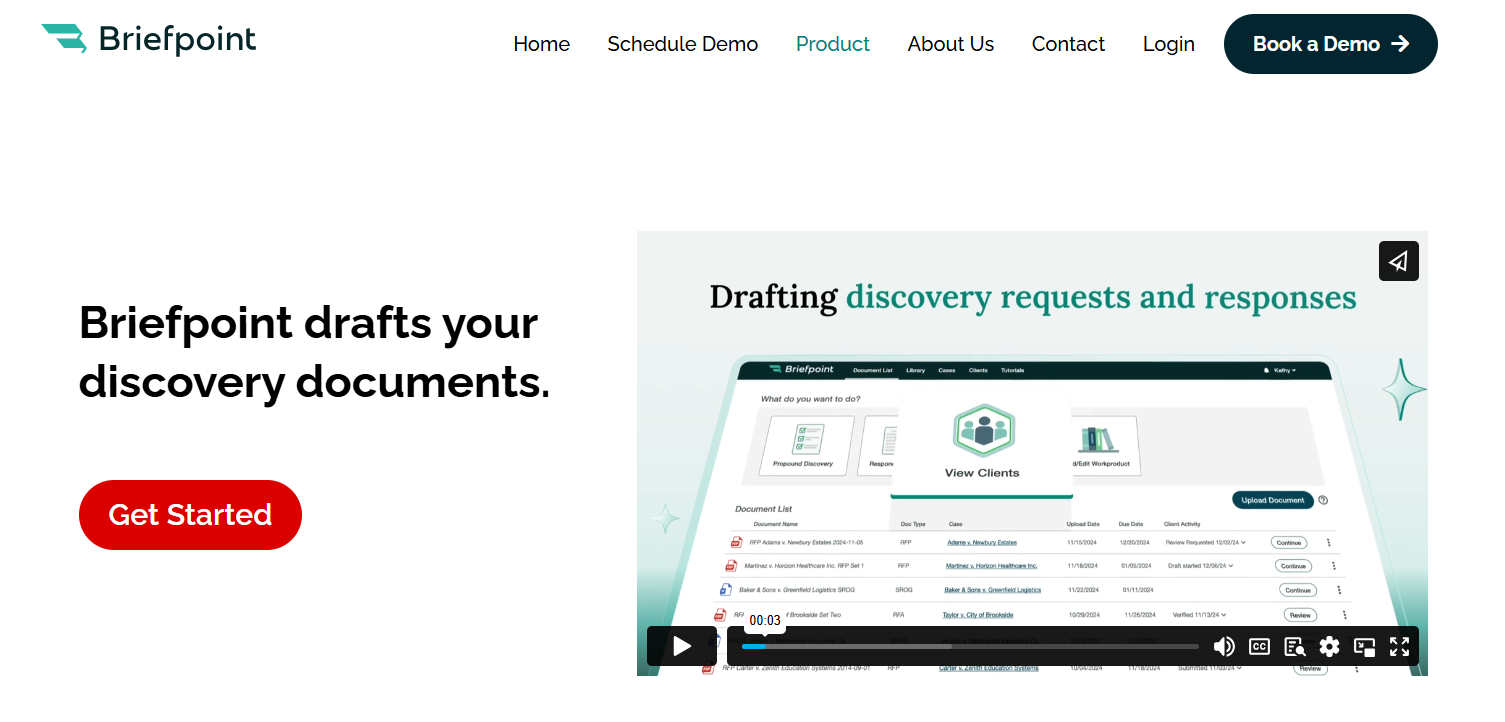
Instead of spending hours drafting Requests for Admission, Requests for Production, interrogatories, and other discovery documents, you can rely on Briefpoint to do the job quickly and accurately.
All you have to do is upload your opposing counsel’s discovery document, add objections and responses, and then download it into Microsoft Word, sign it, and serve. Briefpoint will take care of the rest.
There’s also Briefpoint Bridge, a brand-new feature that lets you collect and plug in client responses to discovery documents without all the back and forth.
With Bridge, you can select which inquiries need client responses, send a link where your client can fill in their answers, and then plug those answers into your discovery document.
As you let this tool handle the drafting, you can shift your attention to the big-picture litigation strategy that will get you ahead.
2. Casetext
Casetext is a legal technology company that takes the pain out of traditional legal research by using advanced AI to make the process faster, smarter, and far less tedious.
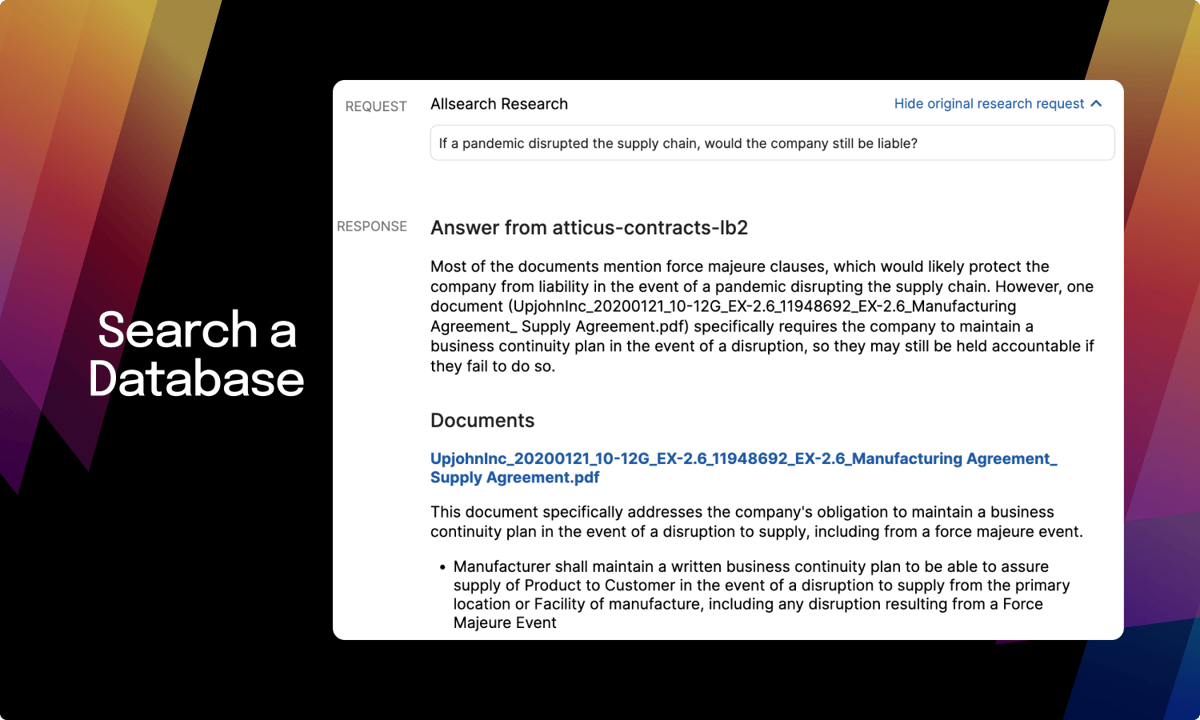
Source: G2
Legal research has always been a time-consuming part of the job, but Casetext changes that. Using natural language processing, it understands the context of your queries and pulls relevant case laws, statutes, and regulations in seconds.
One of its most powerful features is CARA A.I., which reviews your uploaded briefs and instantly identifies case law you might have overlooked. That means stronger legal arguments, more confidence in your filings, and less second-guessing.
As more legal startups and established firms adopt AI to boost productivity, Casetext stands out for its precision and ease of use. Its search engine cuts through massive databases and returns exactly what you need, saving you hours of manual digging.
3. Luminance
Luminance uses advanced machine learning to take the stress out of document review and due diligence. It’s designed for legal teams that want faster, smarter ways to analyze contracts, flag risks, and stay ahead of regulatory compliance.
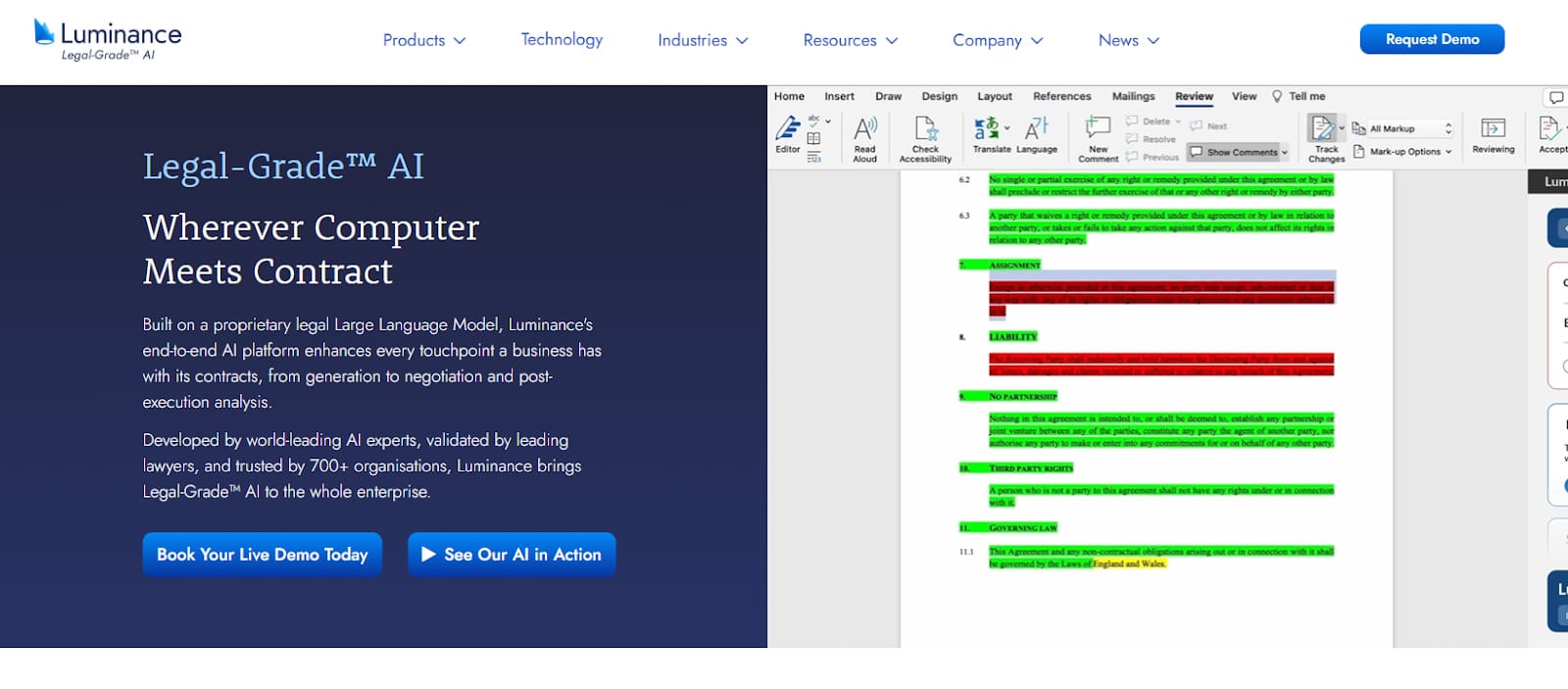
Source: Luminance.com
At its core, Luminance understands legal language. It reads through documents in seconds, highlights key information, and surfaces anything that might need a second look, which makes contract analysis much easier and far more accurate.
What makes it stand out? The platform learns as you go. As it processes more files, it adapts to your review style and gets better at spotting inconsistencies, red flags, and missing clauses. That means less time spent searching and more time acting on the insights.
Whether you’re deep into a high-stakes M&A or just trying to extract data from a stack of NDAs, Luminance helps you move quickly without sacrificing precision.
If your firm deals with a heavy contract load or complex compliance work, this is one AI-powered tool worth adopting.
4. LawToolBox
LawToolBox is an intelligent assistant that legal pros rely on to manage their schedules. Imagine never missing a deadline again—this integration with Microsoft Office makes it a reality, tying everything together in one convenient package.
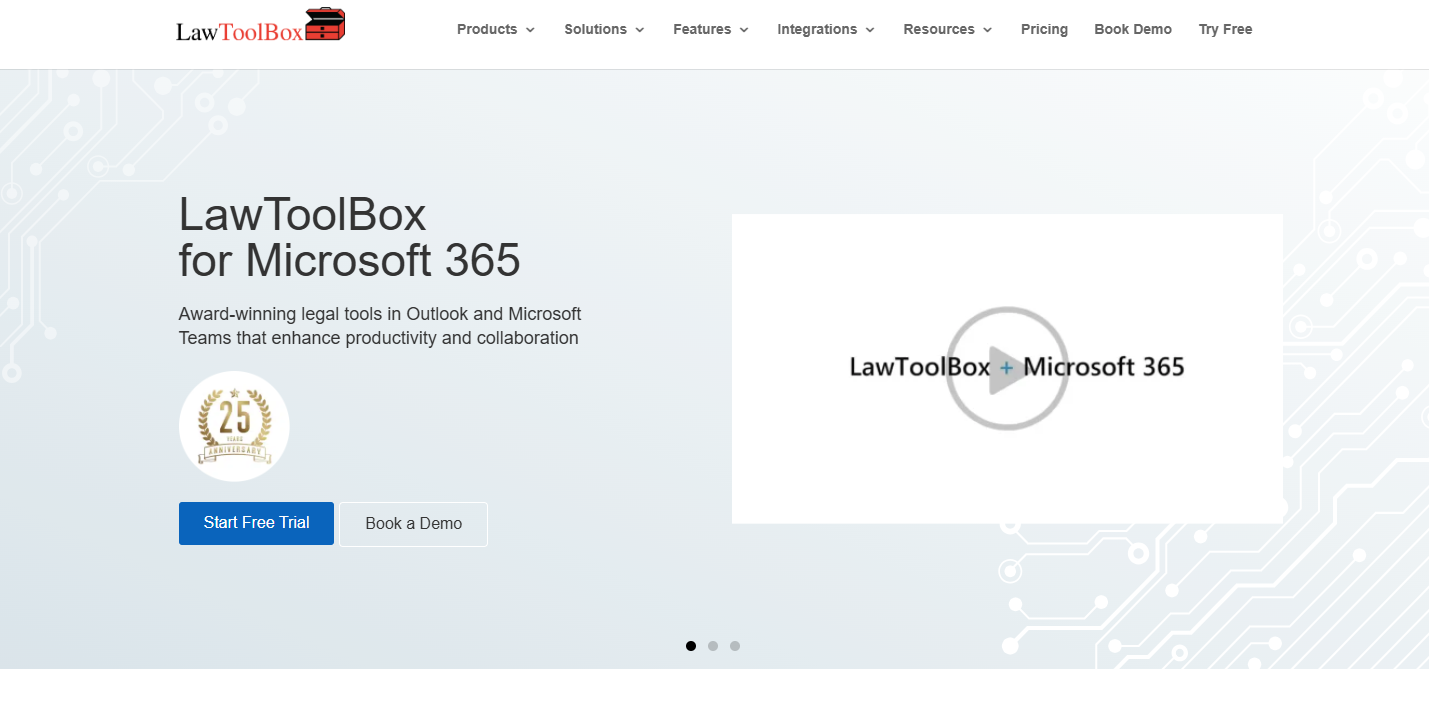
Source: LawToolBox.com
LawToolBox relieves pressure by handling legal deadline calculations. You can enter the case information, and LawToolBox will calculate all the critical dates and update your calendar accordingly. Busy lawyers need this feature to stay on top of looming deadlines and court dates.
LawToolBox also allows for easy collaboration within legal teams. Team members can share calendars and deadlines so everyone is on the same page and nothing falls through the cracks.
Also, the platform’s reminders and notifications help keep everyone on track, which reduces the stress of managing multiple cases and deadlines.
5. Ironclad
Ironclad takes the weight off your shoulders by expertly managing every stage of the contract lifecycle to give you back valuable time and energy.
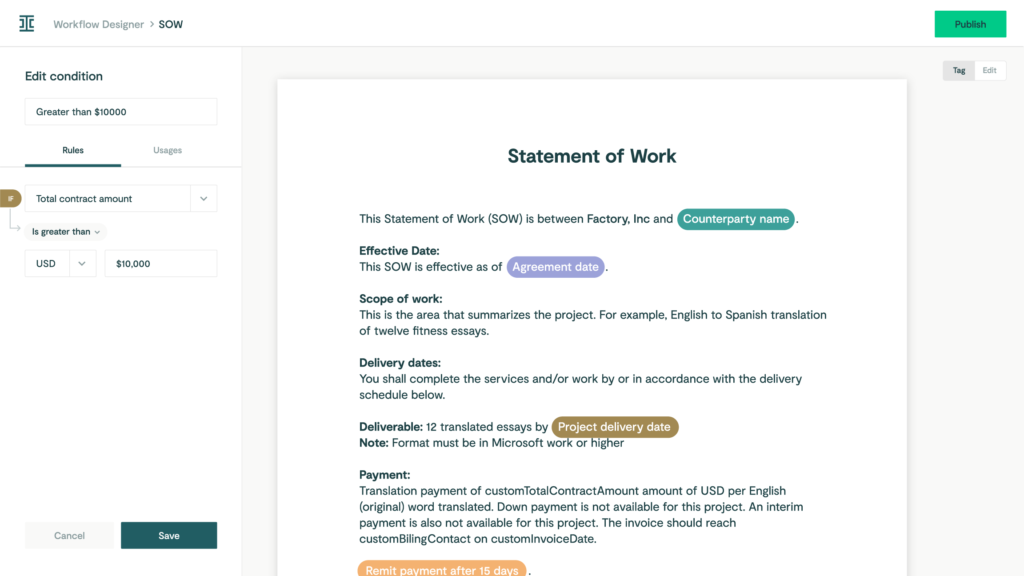
Source: G2
The goal is to make it easier and more efficient for legal teams to handle everything from creation and negotiation to execution and contract review.
One of Ironclad’s key features is its user-friendly interface, which allows you to draft and customize contracts quickly. Its AI capabilities help automate repetitive tasks, like filling in standard clauses and ensuring compliance with company policies.
6. Clio
Clio is like your law firm’s all-in-one assistant, but in the cloud. It helps you keep track of cases, manage billing, organize documents, and stay in touch with clients—all from one easy-to-use platform.
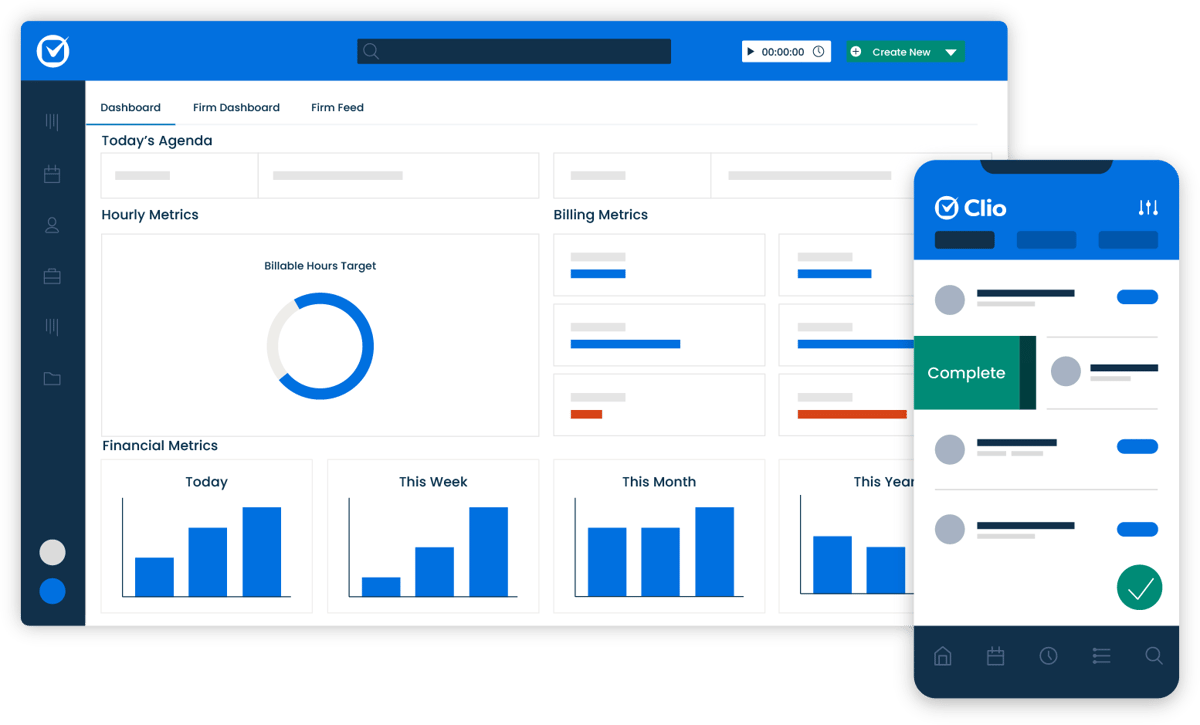
Source: G2
Whether you’re tracking time, scheduling appointments, or collaborating with your team, Clio makes it simple and secure. It’s especially popular with small to mid-sized law firms because it takes care of daily tasks like:
- Case management
- Billing and invoicing
- Time tracking
- Document management
- Client communication
- Calendar management
- Task management
- Reporting and analytics
- Payment processing
7. Everlaw
Everlaw handles due diligence and document review for legal teams. It helps lawyers obtain a higher level of efficiency and insight.
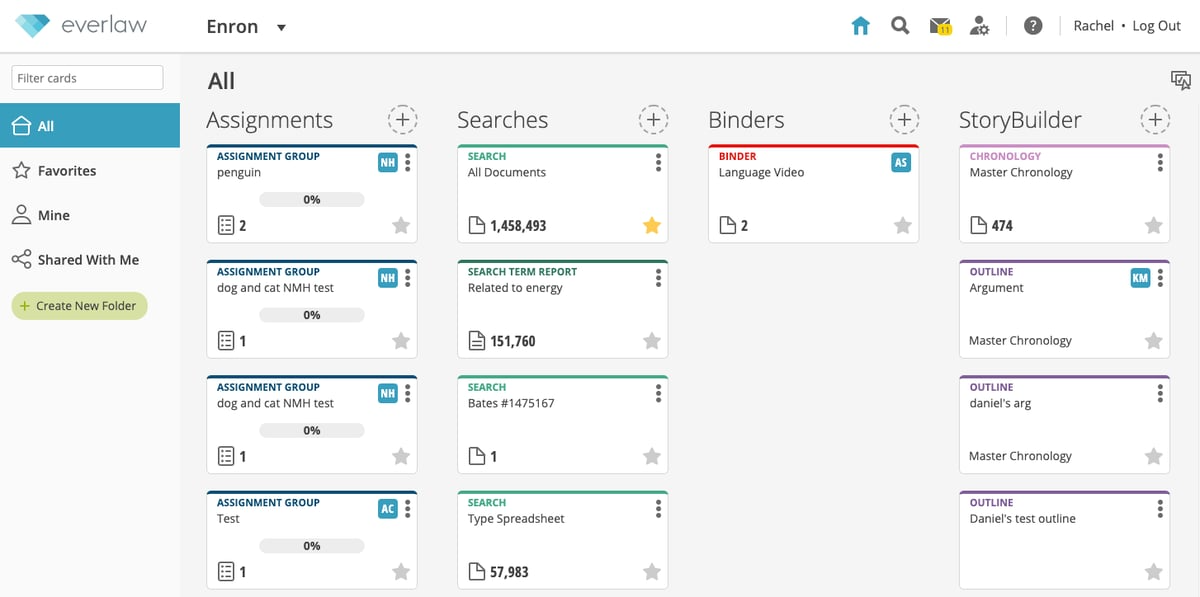
Source: G2
Imagine having a tool that allows you to efficiently sift through legal files, quickly identifying the most critical documents. Everlaw streamlines this process, significantly reducing the time spent on traditionally labor-intensive tasks.
The platform’s intuitive design simplifies document organization. With features such as drag-and-drop functionality, custom tags, and advanced search filters, it is easy to focus on the work without worrying about formatting.
Everlaw also offers robust document review capabilities, including tools for redaction, annotation, and metadata analysis. These features ensure that you can capture and work with all relevant details efficiently and effectively.
Will AI Replace Legal Professionals?
The idea of AI replacing legal professionals is a hot topic, but let’s be clear: while AI is transforming the legal world, it’s not about to replace lawyers. Instead, AI is a tool that enhances what legal professionals can do, not a substitute for their expertise.
AI shines in handling repetitive, time-consuming tasks like document review, legal research, and legal data analysis. These are essential but don’t require the strategic thinking and nuanced understanding lawyers bring to the table.
By automating these processes, AI frees up lawyers to focus on high-stakes strategy, client relationships, and providing expert legal advice.
The human element in law remains irreplaceable. Lawyers navigate the complexities of human behavior, emotions, and motivations while negotiating, mediating, and upholding justice. Ethical and moral judgment—core to the legal profession—can’t be replicated by AI.
AI takes care of the grunt work, but it can’t interpret laws with depth or provide the human connection that clients rely on. Rather than replacing lawyers, AI lightens their load and allows them to work smarter and focus on what they do best.
Start Drafting Legal Documents With Ease
It’s tough to maintain quality when you’re buried in paperwork, especially during discovery.
For litigation teams, drafting Requests for Admission, Interrogatories, and Requests for Production can eat up hours you don’t have. It’s one of the most tedious parts of the process—and one of the easiest to automate.
Briefpoint makes it simple. Just upload the opposing counsel’s discovery document, add your objections and responses, and download a fully formatted version that is ready to sign and serve.

You can even use Briefpoint Bridge to collect responses from clients and plug them into your documents without all the follow-up.
Less time formatting means more time for strategy, client communication, and actual casework.
Want to see it in action? Book a demo and start saving hours on every document.
FAQs About Legal AI Companies
What is Legal AI?
Legal AI refers to using artificial intelligence technologies to perform tasks and legal services traditionally done by lawyers and other legal professionals, such as legal research, document review, and contract management.
How does AI benefit law firms?
When law firms tap into AI, they can reroute resources, target slip-ups, and amass sizable savings–a trifecta of benefits that drive success. With this tool on your side, tedious tasks become a thing of the past, insightful patterns emerge from the noise, and bulky datasets get a serious workout in record time.
Will AI replace lawyers?
No, AI will not replace lawyers or legal departments, but it is changing how legal professionals work. It is designed to assist and augment the work of legal professionals, not replace them. AI can handle repetitive tasks and provide valuable insights, but the expertise and judgment of human lawyers are irreplaceable.
What are some popular AI tools in the legal industry?
Some popular AI tools in the legal industry include Briefpoint, Casetext, Luminance, LawToolBox, Ironclad, and Everlaw.
Is AI expensive for law firms to implement?
Depending on the law firm, the price tag for AI implementation can fluctuate wildly. But here’s the silver lining: many AI tools can adapt to different budgets and firm sizes.
The information provided on this website does not, and is not intended to, constitute legal advice; instead, all information, content, and materials available on this site are for general informational purposes only. Information on this website may not constitute the most up-to-date legal or other information.
This website contains links to other third-party websites. Such links are only for the convenience of the reader, user or browser. Readers of this website should contact their attorney to obtain advice with respect to any particular legal matter. No reader, user, or browser of this site should act or refrain from acting on the basis of information on this site without first seeking legal advice from counsel in the relevant jurisdiction. Only your individual attorney can provide assurances that the information contained herein – and your interpretation of it – is applicable or appropriate to your particular situation. Use of, and access to, this website or any of the links or resources contained within the site do not create an attorney-client relationship between the reader, user, or browser and website authors, contributors, contributing law firms, or committee members and their respective employers.